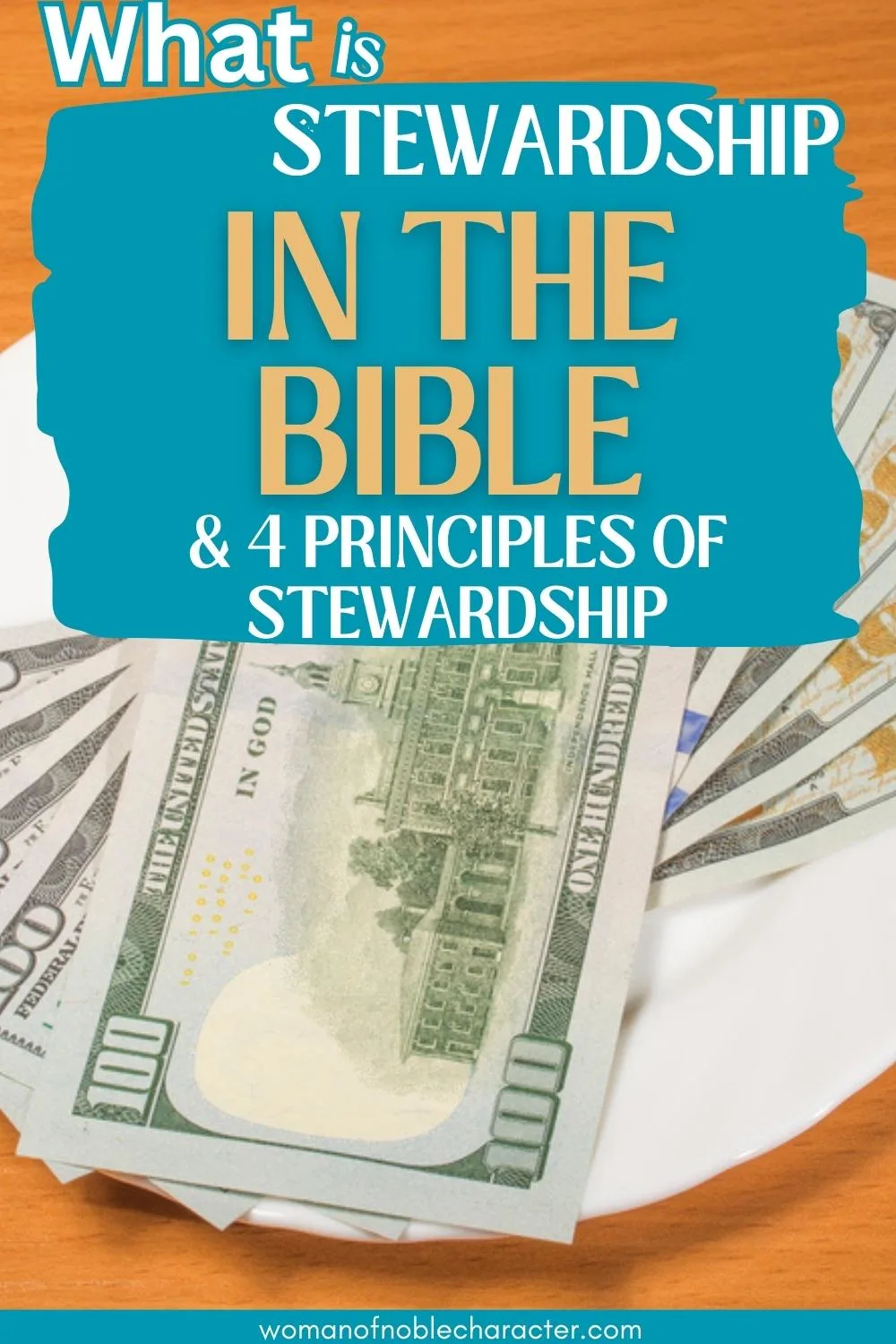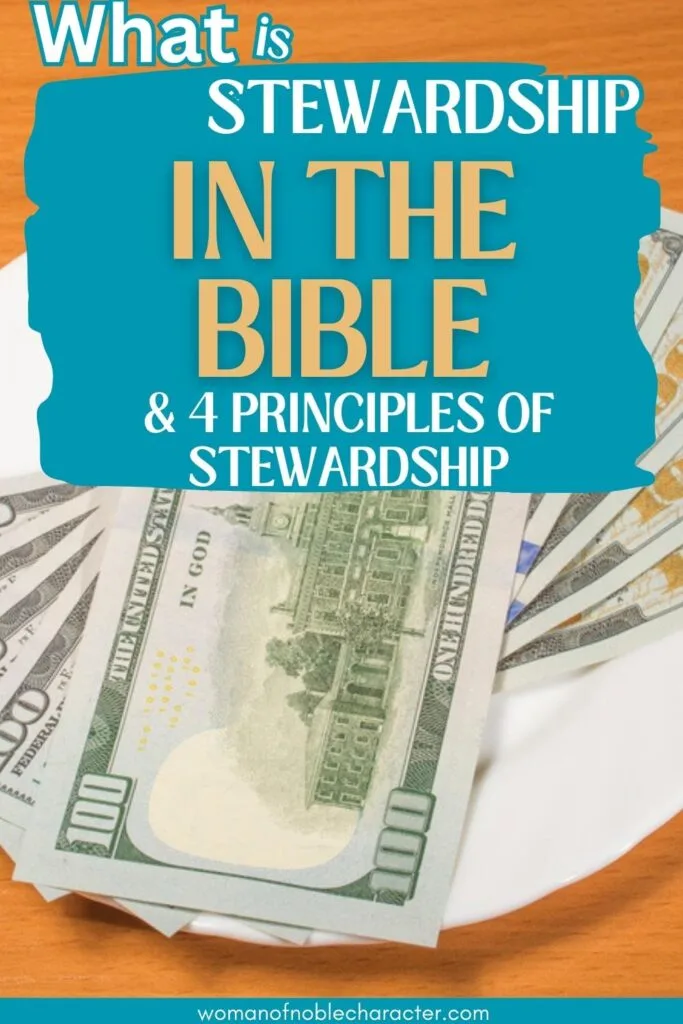This page/post may contain affiliate links. As an Amazon Associate, as well as an affiliate of other programs, this means if you purchase something using these links, I will receive a commission on qualifying purchases at no cost to you! For more detailed information, please visit our Affiliate Disclaimer page
What is Stewardship in the Bible?
Stewardship is how we are called to live as children of the most high God. Stewardship in the Bible is about the responsibility for managing or allocating the resources that He has given us. While it is often spoken about with a focus on money, through the word of God we will learn that it’s much deeper than that.
The Lord of hosts laid the foundations of stewardship in Genesis, and it continues through to the New Testament. Stewardship truly begins with the personal experience of receiving Jesus Christ as our Lord and Savior. Our priorities, thoughts, perspective, and behavior change to please our heavenly father.
We realize that we are agents of the true master and surrender ourselves to Him and His will. As Christians, we make wise decisions to follow and obey God at whatever cost. In our quest to honor the Lord, we use what He has given us wisely to expand His kingdom and glorify Him.
Understanding and practicing good stewardship is one of the best ways to become a mature follower of Christ Jesus.

Biblical stewardship definition
The Oxford Dictionary defines a steward as “a person whose job is to take care of passengers on a ship, an aircraft or a train and who brings them meals, etc.” It also described stewardship as “the act of taking care of or managing something, for example, property, an organization, money or valuable objects.”
According to the Holman Bible Dictionary, stewardship is utilizing and managing all resources God provides for the glory of God and the betterment of His creation.
The form you have selected does not exist.
This could be our time, treasures, talents, skills, spiritual gifts, and resources.
It’s not about giving back to Him but rather using what He has given us to accomplish something more.
Proper management of resources is an act of worship where we are custodians and guardians put in charge of what the Lord God created in a way that honors Him. Christian stewardship is understanding our heavenly father is the ultimate owner of all things, and he is the one with authority. We are merely caretakers, overseers, and managers of what He has entrusted us with.
The New Testament word for stewardship comes from the Greek word oikonomos, which means the manager of the affairs of a household.
Biblical stewardship is understanding that you do things on God’s behalf, and as his ambassador and representative on earth, he expects responsible management of all that is under your care.
Bible verses about Christian stewardship
What does the Bible say about stewardship? In the scriptures below, we learn that we should be good stewards of God’s gifts, grace, and the revelations he gives us. We are to conduct ourselves in a way that pleases Him, be generous, a cheerful giver, and faithful in what we’ve been entrusted with. Ultimately, we will get a reward for doing good deeds and being wise stewards.
Then the Lord God took the man and put him in the garden of Eden to tend and keep it.
Genesis 2:15 NKJV
As each one has received a gift, minister it to one another, as good stewards of the manifold grace of God.
1 Peter 4:10 NKJV
This is how one should regard us, as servants of Christ and stewards of the mysteries of God. Moreover, it is required of stewards that they be found faithful.
1 Corinthians 4:1-2 NIV
For an overseer, as God’s steward, must be above reproach. He must not be arrogant or quick-tempered or a drunkard or violent or greedy for gain,
Titus 1:7 ESV
For if I do this work of my own free will, then I have a reward; but if it is not of my will [but by God’s choosing], I have been entrusted with a [sacred] stewardship.
1 Corinthians 9:17 NKJV
give, and it will be given to you. Good measure, pressed down, shaken together, running over, will be put into your lap. For with the measure you use it will be measured back to you.
Luke 6:38 ESV
Therefore if you have not been faithful in the use of earthly wealth, who will entrust the true riches to you?
Luke 16:11 AMP
Principles of Stewardship
There are some fundamental principles of Christian stewardship we need to understand.
- Principle of Ownership
In the Psalm of David, we learn that the Lord of hosts is the ultimate owner of all living things. This is one of the first things to understand about stewardship as it puts things into perspective for us. If everything belongs to God, we own nothing and are rather humble stewards of everything he gives us.
The earth is the Lord’s, and everything in it,
Psalm 24:1 NIV
the world, and all who live in it;
The Bible says we are not our own; we belong to the one who created us, saved us, and sustains us. Every perfect gift we own is from Him.
Or do you not know that your body is a temple of the Holy Spirit within you, whom you have from God? You are not your own, for you were bought with a price. So glorify God in your body.
1 Corinthians 6:19-20 ESV
Every good and perfect gift is from above, coming down from the Father of the heavenly lights, who does not change like shifting shadows.
James 1:17 NIV
Knowing that our lives and bodies are not our own gives us an obligation to take care of them physically, emotionally, mentally, and spiritually for God’s glory. That’s why self-care is important.
What about your treasure, hard-earned money, and personal finances?
But remember the Lord your God, for it is he who gives you the ability to produce wealth, and so confirms his covenant, which he swore to your ancestors, as it is today.
Deuteronomy 8:18 NIV
We use our God-given ability, power, and strength to make money, so again, he is the rightful owner of everything.
- The principle of responsibility
Anytime you’re responsible for something that belongs to someone else, that’s stewardship. A nanny is the steward of your kids when she’s with them, and you go out to dinner with your spouse. Teachers are stewards of our kids during school hours.
A steward is, therefore, responsible for what they are entrusted with. The foundation of Christian stewardship is found in Genesis.
Then God said, “Let us make man in our image, after our likeness. And let them have dominion over the fish of the sea and over the birds of the heavens and over the livestock and over all the earth and over every creeping thing that creeps on the earth.”
So God created man in his own image; in the image of God, he created him; male and female he created them.
And God blessed them. And God said to them, “Be fruitful and multiply and fill the earth and subdue it, and have dominion over the fish of the sea and over the birds of the heavens and over every living thing that moves on the earth.”
Genesis 1:26-28 ESV
In the beginning, God made Adam and Eve the first stewards. They had God-given dominion to tend to the Garden of Eden. They had to be fruitful not only when it comes to producing more children but expanding the kingdom of God. He asked them for responsible management of every living creature.
With the fall of man, this has been lost, but redemption by our Lord Jesus Christ, calls us to go back to the original design and responsibility for man.
While the earth gives us food, clothing, shelter, and livelihood, the Lord God requires us to take care of this world and everything in it. Besides nature, we are responsible for our households, family members, and finances.
We are also responsible for the spiritual gifts we’ve been blessed with to use them for the glory of God. Everything we have been given, we are responsible for. We are to use it all not for our own enjoyment but for those around us, our families, and ultimately God’s kingdom.
- The principle of accountability
Through the words of the Lord Jesus Christ, we learn about good stewardship and the principle of accountability in the Parable of the Talents found in Matthew 25:14-30.
In this Parable, a man went on a journey and entrusted his three servants with his possessions. To one, he gave five talents; to the other two, and to the third servant, he gave one talent. Both the one with five and the one with two doubled their master’s money. When the master of those servants returned after a long time, he was pleased with them.
His master said to him, ‘Well done, good and faithful servant. You have been faithful and trustworthy over a little, I will put you in charge of many things; share in the joy of your master.’Matthew 25:23 AMP
The master’s happiness was in the two servants who had taken the little they were given and multiplied it. Because of that, he decided to put them in charge of many things because he could trust them.
The third servant with one talent, however, hid it under the ground because he knew his master was a hard man, but the master was not happy with this result.
But his master answered him, ‘You wicked, lazy servant, you knew that I reap [the harvest] where I did not sow and gather where I did not scatter seed. Then you ought to have put my money with the bankers, and at my return, I would have received my money back with interest. So take the talent away from him, and give it to the one who has the ten talents.’
Matthew 25:26-28 AMP
All three servants were accountable for what they did with the master’s money. Just like in the Parable of the Talents, the Lord God will ask you to give an account of your management of the money, opportunities, talents, time, testimony, and resources you’ve been given.
- The Principle of Reward
We see in the Parable of Talents that the servants who doubled what their master gave them were rewarded. The master gave them even more talents, and more responsibility and told them they would share in his joy and happiness. At the proper time, we will get our reward for all the good works we do. This is what Apostle Paul says:
Whatever you do, work heartily, as for the Lord and not for men, knowing that from the Lord you will receive the inheritance as your reward. You are serving the Lord Christ.
Colossians 3:23-24 ESV
One of the best ways we get rewarded is when we’re good stewards of our money in the house of God. The very words of God assure us that when we’re faithful in our tithing, we will be blessed.
Bring the full tithe into the storehouse, that there may be food in my house. And thereby put me to the test, says the Lord of hosts, if I will not open the windows of heaven for you and pour down for you a blessing until there is no more need.
Malachi 3:10 ESV
Best examples of Biblical stewardship
The word of God gives us some great examples of wise stewards that we can look up to. As we follow their example, we will reap the same benefits they did and grow spiritually in our walk with the Lord.

- Jesus, the best example of a Christian steward
As disciples of Christ Jesus, we know that we look up to him for everything. He was the perfect steward who gave up all He had as a way of obeying his father’s instructions.
Jesus took on his role with joy. He understood his purpose and assignment and was sensitive to the needs of others.
He was the custodian of his followers and disciples, and he took care of them as the great shepherd he is. This is apart from Judas, though, but Jesus knew already that Judas would betray him to fulfill the scriptures.
This was to fulfill and verify the words He had spoken, “Of those whom You have given Me, I have not lost even one.”
John 18:9 AMP
- Jesus’ disciples
Following in their master’s footsteps, the disciples were good stewards of God. After Jesus died, they evangelized and spread the gospel all over the earth. It is because of their great work that we also today have heard the good news and believe in the Lord.
- Joseph was a wise steward
Joseph, the son of Jacob, is one of the best examples of biblical stewardship. As a servant in the house of his Egyptian master, he was a good man, a diligent worker, and got promoted from a faithful slave to become a wise manager of a household.
From the day Joseph was put in charge of his master’s household and property, the Lord began to bless Potiphar’s household for Joseph’s sake. All his household affairs ran smoothly, and his crops and livestock flourished.
Genesis 39:5 NLT
- God’s steward Moses
When God had a need for a leader for the people of Israel, he chose Moses. As God’s faithful steward, he led them for a long time, serving as their guide from Egyptian bondage, and throughout the forty years, they wandered in the wilderness.
- King David
Even before he became king, David honored the Lord with his gifts as a shepherd boy. As a king, he was a good steward of his good gifts of being a warrior and made wise decisions that helped expand the kingdom of God.
- The faithful servants
Jesus Christ taught about being faithful servants in Matthew 24:42-51 who are diligent and hardworking whether the master is there to inspect their work or not. As a wise manager, the faithful servant takes care of others, is responsible, and manages the resources God has given him well.
The form you have selected does not exist.
What are the qualities of a good steward?
From the Biblical examples of stewardship, we learn the top qualities of a good steward.
- Be honest and trustworthy
- A faithful steward is wise
- Be hard-working and diligent
- Be fruitful and productive in your areas of responsibility
- Trust God as the rightful owner of all things
- Be responsible and accountable
- Be faithful to what has been entrusted in their care
- Rely on the Lord and be prayerful
- Be proactive in doing good deeds for others
- Discern the Holy Spirit and allow him to guide you in making wise decisions.
There are things God expects from us as good stewards in the church. We are to give the full tithe and contribute to the offering, missionary works, and any needs the church has.
As faithful servants of Christ, we are to also give of our time and be volunteers, serve the church, and use our spiritual gifts for the glory of God.
We are called to love our fellow human beings and meet the needs of others. Not only our family members’ needs but also those of the widows, children, orphans, and destitute among us. As we become faithful stewards to serve the common good and further the kingdom of God, we will be richly blessed.
You may enjoy this sermon by Tony Evans on The Meaning of Stewardship:
Good books to read on Biblical stewardship
Biblical Stewardship by Alfred Martin
Kingdom Stewardship by Tony Evans looks at how we can use our time, treasures, and talents for God’s glory.
Crazy Busy by Kevin Deyoung gives practical tips to help you be a better steward of your time.
ESV – “Scripture quotations are from The ESV® Bible (The Holy Bible, English Standard Version®), copyright © 2001 by Crossway, a publishing ministry of Good News Publishers. Used by permission. All rights reserved.”
NKJV – Scripture taken from the New King James Version®. Copyright © 1982 by Thomas Nelson. Used by permission. All rights reserved.
NIV – Scriptures taken from the Holy Bible, New International Version®, NIV®. Copyright © 1973, 1978, 1984, 2011 by Biblica, Inc.™ Used by permission of Zondervan. All rights reserved worldwide. www.zondervan.com The “NIV” and “New International Version” are trademarks registered in the United States Patent and Trademark Office by Biblica, Inc.™

